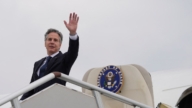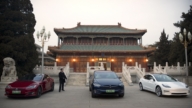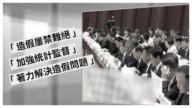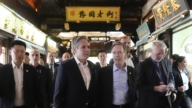【新唐人2012年6月1日讯】最新一期《学习时报》,刊登了习近平在5月16号中央党校的讲话,他说,大批当前一些党员和干部存在“假大空”的问题,他承认,当前世情、国情、党情继续发生深刻变化,前进中还会遇到各种可以预见和难以预见的矛盾和问题,但“不提超越阶段目标”。所谓“超越阶段目标”是指什么目标?分析认为,习近平是在担忧中共正面临的解体问题。
习近平在最近讲话中批评当前一些党员和干部,存在不按客观规律办事,急功近利,说假话、大话、空话的问题。他说,领导干部一定要求真务实—-讲实情、讲真话,出实招、办实事、求实效。
网络作家吴建国认为,这些大道理讲起来容易,但实行起来非常难。
网络作家 吴建国:“特别是中共本来就是靠欺哄讹诈起家的,从战争年代到和平时期,都是靠谎言来维持这个政权。中共的大多数官员也是靠假大空来谋取的官位。因此他提出的这个所谓的务实是没有实际意义的。”
而时事评论员史达质疑:习近平呼吁的“讲真话”能讲到什么程度?中共历史上的罪恶、镇压法轮功、活摘器官、天安门自杀伪案、六四屠杀、江泽民卖国等等这些都可以讲吗?
史达认为,习近平为了救中共,大批“假大空”,这很像邓小平当年提出的“摸着石头过河”的实用主义,就是为了解救中共在极大的危机的时候,提出的一个办法。
时事评论员 史达:“习近平提出这个反对假大空、讲真话,策略上是一个进退之策吧,他不要像温家宝这样提出现在马上进入改革这样的方式,同时他在另一方面是反对和压制了血债派,因为他说要开放言论嘛。讲(真相)出来之后,我想中共真的会倒台,包括清算血债派和清算江泽民,所以它是一个又可以进、又可以退的一个策略。”
习近平在讲话中还承认,当前世情、国情、党情继续发生深刻变化,前进中还会遇到各种可以预见和难以预见的矛盾和问题。但“不提超越阶段的目标”。吴建国表示,这一切说明习近平已经感受到中共面临解体的危机。
吴建国:“他所谓的‘不提超越阶段的目标’,我的理解是,他还是要尽力维护中共政权,所谓的‘不超越阶段的目标’,或许就是不去想中共解体的事,而尽力挽救中共面临的解体危机。”
有分析认为,十八大后习近平就会成为中国的第一号人物,但是对他来说,老大也不是那么好当的,面对南海冲突、陈光诚事件、海外孔子学院问题,还有一直没有平息的“重庆事件”,以及不断出现的各种社会问题,习近平的担忧,其来有自。
吴建国表示,在一些关键问题,比如政改问题上,习近平都是含糊其词,或许是他在隐藏自己的观点。他认为,如果习近平真有诚意求真务实,那就把“六四事件”和“镇压法轮功”的真相揭露出来。但是,那样就可能导致中共解体。因此,不是习近平做不到,而是他愿不愿意做的问题。
采访编辑/常春 后制/孙宁
Xi Jinping Criticizes Dishonesty to Avoid Fall of CCP
Study Times recently published a speech by Xi Jinping
from May 16.
The speech took place at the CCP’s Party School
of the Central Committee.
Xi said in the speech that “dishonesty, boasting
and hollowness” is currently a common problem among many Party members.
He acknowledged critical changes in the current global
situation, as well as China and the CCP.
However, he refused to address any topic
“beyond the current stage.”
Analysts believe such topics are on the disintegration of
the CCP. This worries Xi and other CCP leaders.
In his recent talk Xi Jinping criticized some Party members
for disobeying objective rules.
He also criticized pursuing short-term success
with lies, boasting and hollow words.
He required CCP cadres to be honest and down to earth.
He encouraged them to tell the truth, take real measures,
do practical work, and seek practical results.
Internet writer Wu Jianguo believes that these slogans
are easier said than done.
Wu Jianguo: “CCP was established upon lies and blackmail.
Throughout times of war and peace,
it maintains its rule only by lying.
Most CCP officials also rely upon
hypocrisy to obtain their positions.
Therefore, the so-called ‘honesty’ Xi
proposed bears no significance.”
Political critic Shi Da questioned to what extent Chinese
people tell the truth as Xi Jinping required.
Would it be possible for people to talk about the suppression
of Falun Gong, organ harvesting, or staged “self-immolation”
in Tiananmen Square, June 4 massacre, Jiang Zemin’s
traitorous deeds, or other crimes the CCP has committed?
Shi Da believes that Xi’s criticism of dishonesty
and hollowness largely resembles Deng Xiaoping’s
pragmatic policy of “feeling one’s way through the river.”
Both are strategies rendered at critical times
to save the life of the CCP.
Shi Da: “Xi Jinping’s criticism of dishonesty
and hollowness is a temporary strategy.
It is different from Wen Jiabao’s call for immediate reform.
On the other hand, he proposes free speech, which opposes
those CCP leaders who have committed bloody crimes.
When people can freely tell the truth, I believe the CCP will
really disintegrate.
This will be followed by the judgment and punishment
of Jiang Zemin. In that sense, it could be a strategy of change.”
Xi Jinping also admitted the changes in the current global
situation, China, and the CCP, as well as potential problems and difficulties.
He asked, however, not to exceed
“goals of the current stage.”
Wu Jianguo said Xi’s speech indicates
his awareness of the CCP’s crisis of disintegration.
Wu Jianguo: “As I understand it, Xi Jinping still tries
to preserve CCP rule.
So-called “goals of the current stage” means avoiding
CCP disintegration and trying to solve its current crisis.”
Some analysts believe that after the CCP 18th Assembly,
Xi Jinping will become the CCP No.1 leader.
As President, he will have to face current problems,
including conflicts in the South China Sea,
Chen Guangcheng, deportation of the Confucius Institute
faculty, and the on-going Chongqing political scandal.
Xi Jinping has good reasons to be worried.
Wu said that Xi Jinping has been silent on a number
of key issues, such as political reform. Xi might have been hiding his opinions.
Wu believes that Xi should expose the truth of the Tiananmen
incident and the persecution of Falun Gong, if he really means to be sincere and honest.
That might, however, lead to the CCP’s disintegration.
Therefore, it is a problem of how Xi wants to address these issues.



























